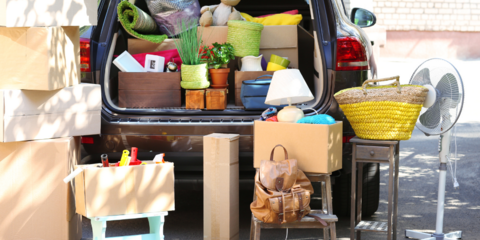
What Happens If You Overload Your Car?
Know the issues that could occur if you overload your car
It can be tempting to store things in your vehicle, and if you’re going on a last-minute autumn break, you may be loading your car with all the luggage you think you need. However, did you know that it’s possible to overload your car?
5 issues that could occur if you overload your car
If your car could do with a clear-out, listen up; here’s what happens if you overload your car…
1. Your brakes and suspension will wear quickly
If your car has been overloaded, the sheer weight of it will make it harder for the brakes and suspension to work properly. Not only is this dangerous, but you’ll also be wearing them out quicker by driving around with an overloaded car, seeing you pay for replacements sooner than if your car was its usual weight.
2. Your car will be harder to control
As we’ve just alluded to, your brakes will be affected by too much weight in the vehicle, and therefore your stopping distance will be increased. However, you’ll also find steering and manoeuvring trickier too, and getting up to speed will take longer than you’re used to.
3. Your fuel consumption will increase
As your car has to work harder to get going with extra weight on board, you’ll find yourself visiting the fuel pumps more often than you’d like - harder work means a quicker fuel burn! Not only is this unkind to your budget, it’s also bad news for the planet.
4. You’ll need new tyres
Remember how your car will have to work harder to get going with all that weight on board? Well, it takes its toll on your tyres too. Your tyres will wear more quickly, they’re at risk of overheating, and you could, catastrophically, suffer a tyre blowout in extreme cases of overloading.
5. You’ll be on the wrong side of the law
It’s illegal to drive an overloaded car — and it’s no surprise that with such serious safety implications. If you’re found to be driving an overloaded vehicle, penalties include 3 points on your licence and a fine of up to £300.
If your offence is particularly serious and you’ve caused or could cause a danger to other road users, you could be taken to court, be ordered to pay a larger fine of up to £5,000, face a driving ban, or even serve a sentence in prison.
Don’t forget that if your car is involved in an accident and it’s found to be overloaded, your car insurance could be invalidated, meaning paying for repairs from your own pocket, and struggling to get car insurance in the future.
How can I avoid overloading my car?
1. Find out how much weight your car can carry
Your car will have a Gross Vehicle Weight Rating, which is your car’s weight limit. It should be detailed somewhere in your vehicle’s handbook and will correspond to your vehicle’s VIN number. Don’t forget that your vehicle’s weight will include the fluids on board, such as fuel, oil and coolant, as well as the weight of you and any passengers.
2. Load the car correctly
If you do need to load your car, it’s best to make sure that the heaviest items are placed low down in the car, to keep its centre of gravity where it should be. Beyond that, ensure everything you load is evenly distributed to give your car the best chance of handling well.
